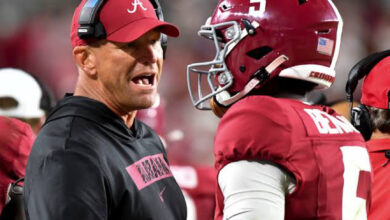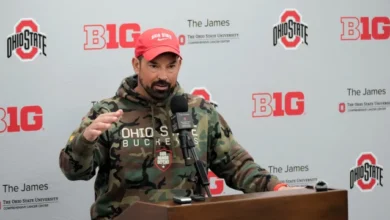
In a stunning and emotional farewell, Auburn Tigers’ now-former head coach Hugh Freeze reportedly closed his chapter at Auburn with the words, “I will miss this place as it was once home for me.” While seemingly sentimental on the surface, Freeze’s parting remark has ignited a firestorm of controversy, outrage, and reflection among Auburn fans, players, and the broader college football community.
For some, Freeze’s farewell was an undeserved romanticizing of a turbulent tenure marred by off-field drama, inconsistent leadership, and unmet expectations. Others saw it as a genuine expression of attachment to a program that, despite the controversies, offered him a second chance after his fall from grace at Ole Miss.
A Polarizing Tenure
Freeze’s arrival at Auburn was controversial from the start. After being forced out at Ole Miss amid scandal — involving NCAA violations and personal misconduct — Freeze’s hiring raised questions about Auburn’s standards and priorities. His rocky tenure only deepened the divisions: questionable play-calling, locker room rumors of favoritism, and struggles against SEC powerhouses kept Auburn painfully inconsistent under his leadership.
Yet, despite these challenges, Freeze developed strong personal relationships with certain players and boosters. In private circles, he was described as a “redeemed man” — someone who genuinely wanted to rebuild his legacy and Auburn’s glory together. This complex duality — sinner and redeemer, villain and hero — is perhaps best encapsulated in his emotional final words.
The “Home” He Helped Fracture?
Critics argue that Freeze calling Auburn “home” is deeply ironic, if not offensive. They point out that under Freeze’s leadership, Auburn lost not just games, but also a piece of its identity — traditionally rooted in resilience, integrity, and family. His brief era was defined by culture clashes, the transfer portal exodus of key players, and a fanbase split between loyalty and disbelief.
“If this was home for Freeze,” one prominent Auburn alum said on social media, “then he didn’t mind leaving it in ruins.”
Fans flooded message boards and radio shows with their anger, calling Freeze’s words “tone-deaf,” “self-serving,” and “an insult to the Auburn family.”
A Reflection of College Football’s Moral Crisis?
Freeze’s emotional farewell also speaks to a broader crisis in college football — where winning, redemption narratives, and second chances often trump accountability and lasting culture-building. Programs desperate for quick turnarounds continue to gamble on controversial figures, often to their own detriment.
Was Freeze’s Auburn tenure another cautionary tale about valuing reputation over results, charisma over character? Many think so. His last words serve not just as a farewell but as a damning reminder of Auburn’s gamble — and the painful costs when such gambles fail.
Conclusion
Whether you view Hugh Freeze as a tragic figure seeking redemption or a flawed coach who overstayed his welcome, his final words, “I will miss this place as it was once home for me,” cut deeply into Auburn’s soul. They reveal a program still grappling with its values — and a man who, despite it all, perhaps never fully understood what Auburn was truly supposed to be.
The real question now is: Can Auburn move forward from a “home” that Freeze helped redefine — and will the next era restore the spirit that many believe was lost?









